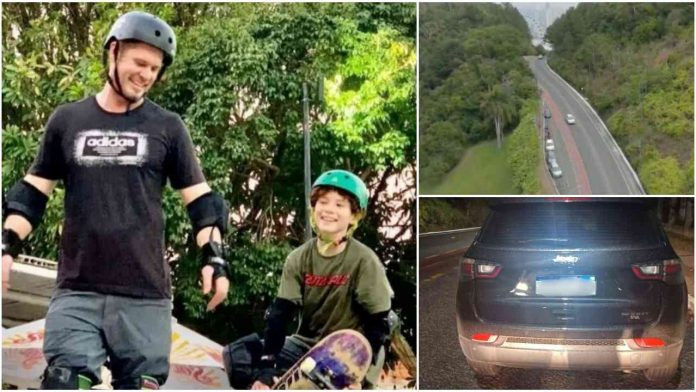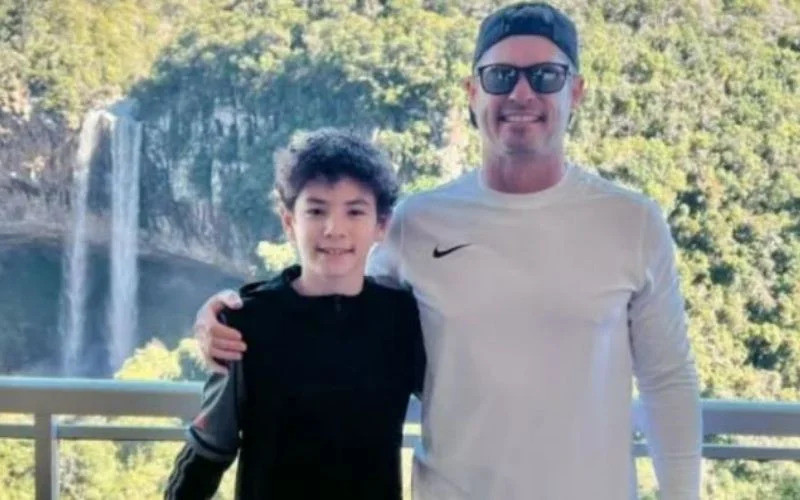In a shocking incident that has gripped Brazil and beyond, Mark Alexander Cummings Rogers, a father living in Balneário Camboriú, took his 13-year-old son on a survival challenge in a remote jungle to “cure” his phone addiction, only to leave them both lost and starving. Reported missing on August 28, 2025, the duo was found five days later in a desolate area near Morro do Careca, roughly 3,500 kilometers from their home. The boy, severely malnourished, devoured bread on sight, while Rogers now faces up to a year in prison for endangering a minor. The saga has ignited a firestorm online: was this a desperate bid to save his son from technology, or a reckless act with lasting consequences?

Brazilian authorities tracked the pair using clues from an abandoned Jeep with U.S. plates and Rogers’ discarded phone. Rescued on September 2, the boy was found dehydrated and weak, his condition sparking horror among locals. “He lunged at the bread like he hadn’t eaten in days,” a rescuer recounted. Rogers explained that he drew inspiration from a survival reality show, aiming to disconnect his son from screens by immersing him in nature. Having lived in Brazil for six years, the father believed the challenge would build resilience, but the plan backfired, leaving them stranded without supplies. Social media erupted, with one X user posting, “A digital detox shouldn’t mean starvation!” Another quipped, “This is Bear Grylls gone wrong!”
The incident came to light when the boy’s school reported his absence, prompting a police search. Now, the 13-year-old is staying with a friend’s family for safety, while Rogers remains in custody, facing charges under Brazilian law for putting his son at risk. The case has fueled intense debate online, with many slamming Rogers’ approach as extreme. “Helping kids with screen time is one thing, but dragging them into a jungle? That’s insanity,” one TikTok user commented. Others sympathized, with an Instagram post noting, “He meant well, but this was dangerous.” The controversy raises a question: where’s the line between tough parenting and reckless endangerment?

Psychologists have weighed in, warning of potential trauma. “Forcing a child into a survival scenario can leave deep psychological scars,” one expert noted, advocating for guided, supportive methods to manage tech use. Data from Brazil’s Child Welfare Council shows over 1,200 cases of parental neglect in 2024, with extreme disciplinary actions increasingly reported. Rogers’ case, though unique, taps into broader concerns about parenting in the digital age. Fans ask: could a balanced approach—like limiting screen time at home—have avoided this disaster?
Social media platforms are ablaze with reactions. A viral TikTok video reenacting the jungle ordeal, captioned “When your dad takes ‘no phones’ too far,” has millions of views. Another X post read, “Rogers thought he was saving his kid, but he nearly lost him.” The debate has sparked tips from parents, with one suggesting, “Talk to your kids about tech, don’t starve them in a forest!” The incident also highlights Brazil’s rugged terrain, where Morro do Careca’s dense jungle poses real dangers, even for experienced adventurers.

As the investigation continues, Rogers’ fate hangs in the balance. If convicted, he faces up to a year in jail, but the court of public opinion is already divided. Some see him as a misguided father desperate to protect his son from digital overload, while others condemn his actions as abusive. The boy’s recovery, both physical and emotional, remains a priority, with counselors monitoring his well-being. Will this case prompt parents to rethink drastic measures, or fuel calls for stricter oversight?
For now, the jungle ordeal serves as a cautionary tale about the lengths parents go to in the name of love. As one Reddit user put it, “Tech addiction’s real, but jungles aren’t the answer.” The question lingers: how can parents guide kids away from screens without crossing into danger? The world awaits answers as Brazil’s courts and social media weigh in on this unforgettable saga.


